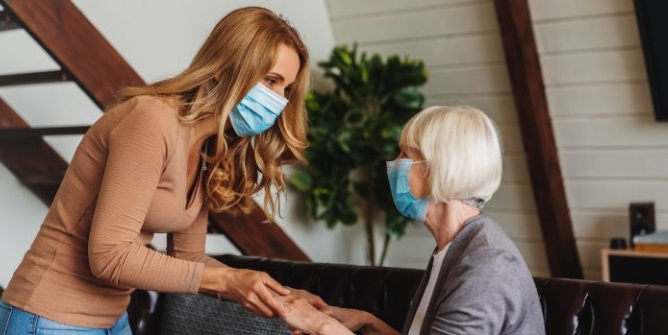
How Caregivers Can Care for Themselves
Caregivers devote themselves to the well-being of others, but to be their best they need to practice self-care.
Being a caregiver for an adult with a chronic condition is hard, and can be emotionally exhausting. It can result in a range of feelings, from loneliness, sadness and fear to anger, worry and guilt. Plus, such high levels of stress can lead to anxiety and depression, weaken the immune system, and increase your risk of serious chronic illnesses such as heart disease and arthritis.
This is why caregivers need to remind themselves that they need care, too, and should give themselves the opportunity to rest and rejuvenate. Here are four self-care tips that can prevent caregiver burnout and fatigue, even during the age of social distancing.
Reach Out for Help
Caregivers put a lot of responsibility on their shoulders, but that doesn’t mean they need to carry the emotional burden themselves. Be willing to accept assistance and reach out to a psychologist or mental health professional to help deal with your stress and anxiety. With the pandemic, you may be hesitant to set up an in-person appointment, but there are still opportunities for virtual visits, and a wealth of mental health resources available online for free. Studies have shown that talking through your feelings with another person can have a significant positive impact on your mental health.
If you feel more comfortable talking to someone you know, don’t be afraid to speak with a family member or close friend whom you trust to talk about your struggles.
Take Advantage of Respite Care
It might be hard to leave loved ones in the care of others even for a brief period, but respite care can give you a much-needed break. Respite care is when primary caregivers share the responsibility of caregiving—and get support for themselves—by leaving loved ones in the hands of professionals for a short period of time. Caregivers can do this by enlisting paid carers to watch a loved one in their home or by leaving a loved one in an out-of-home care facility, such as a nursing home or adult day care center. While their loved ones receive care from professionals, primary caregivers can rest, relax, see other family, take care of other responsibilities, or simply take a day to do something they enjoy. The National Respite Network can help you find providers, programs and resources in your community.
Some services even offer in-home care, which could put you and your loved one at ease knowing they’re in a familiar place.
Manage Your Basic Needs
When you’re completely devoted to caring for another person, it can be easy to neglect your own health. But without a healthy diet, proper sleep and enough exercise, you won’t be at your best, which means you may not have the capacity to effectively care for others. So don’t ignore your body when your stomach growls; grab a quick snack instead. Feel weak or shaky? Give yourself a few minutes to sit down and regroup. When you listen to your body, you and the person you care for will benefit.
Practice Relaxation Techniques
Practicing relaxation techniques such as deep breathing exercises, guided meditation, guided imagery, yoga and progressive muscle relaxation takes only minutes out of your day but can greatly reduce stress and improve your mood. And with smartphone apps such as Calm and free yoga classes online, you don’t even have to leave your bedroom to get started.
Source: National Hemophilia Foundation, HEMAWARExpress